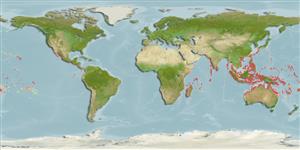Teleostei (teleosts) >
Beloniformes (Needle fishes) >
Hemiramphidae (Halfbeaks)
Etymology: Hyporhamphus: Greek, hypo = under + Greek, rhamphos = beak, bill (Ref. 45335).
Eponymy: Jean-Jacques Dussumier (1792–1883) was a French merchant, collector, traveller and ship owner. [...] (Ref. 128868), visit book page.
More on author: Valenciennes.
Environment: milieu / climate zone / depth range / distribution range
Ecology
Marine; reef-associated; depth range 0 - 6 m (Ref. 86942). Tropical
Indo-Pacific: Seychelles (Ref. 2334) through the East Indies, Borneo, Philippines, and New Guinea north to Hong Kong and Okinawa and eastward as far as Tuamoto Islands.
Size / Weight / Age
Maturity: Lm ? range ? - ? cm
Max length : 38.0 cm SL male/unsexed; (Ref. 54980); common length : 19.0 cm SL male/unsexed; (Ref. 9843)
Dorsal spines (total): 0; Dorsal soft rays (total): 14 - 16; Anal spines: 0; Anal soft rays: 14 - 16; Vertebrae: 56 - 60. Prolonged, beak-like lower jaw, contained in 4.2-5.9 times in SL and 0.95-1.4 times in head length; upper jaw short, triangular, and scaly, its width 0.6-0.9 times in its length; length of preorbital bone contained in 1.7-2.2 times in diameter of orbit and 1.0-1.4 times in length of upper jaw. Total number of gill rakers on first arch 33-47; dorsal and anal fin rays 14-16. Caudal fin forked, with lower lobe longer than upper (Ref. 9843).
Most common around islands and coral reefs (Ref. 6041). Found in schools at surface of lagoon and seaward reefs (Ref. 9710, 48635). Marketed fresh and dried salted (Ref. 9843).
Life cycle and mating behavior
Maturity | Reproduction | Spawning | Eggs | Fecundity | Larvae
Collette, B.B., 1974. The garfishes (Hemiramphidae) of Australia and New Zealand. Records of the Australian Museum 29(2):11-105. (Ref. 10988)
IUCN Red List Status (Ref. 130435: Version 2024-1)
Threat to humans
Harmless
Human uses
Fisheries: commercial
Tools
Special reports
Download XML
Internet sources
Estimates based on models
Preferred temperature (Ref.
123201): 24.6 - 29.3, mean 28.4 °C (based on 3118 cells).
Phylogenetic diversity index (Ref.
82804): PD
50 = 0.5000 [Uniqueness, from 0.5 = low to 2.0 = high].
Bayesian length-weight: a=0.00257 (0.00115 - 0.00574), b=3.09 (2.91 - 3.27), in cm total length, based on LWR estimates for this Genus-body shape (Ref.
93245).
Trophic level (Ref.
69278): 3.5 ±0.48 se; based on food items.
Resilience (Ref.
120179): High, minimum population doubling time less than 15 months (Preliminary K or Fecundity.).
Fishing Vulnerability (Ref.
59153): Moderate vulnerability (36 of 100).
Nutrients (Ref.
124155): Calcium = 209 [47, 470] mg/100g; Iron = 0.715 [0.260, 2.500] mg/100g; Protein = 18.2 [15.3, 20.6] %; Omega3 = 0.105 [0.048, 0.313] g/100g; Selenium = 21 [9, 55] μg/100g; VitaminA = 285 [74, 954] μg/100g; Zinc = 1.17 [0.47, 3.22] mg/100g (wet weight); based on
nutrient studies.
